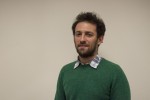Column Name
Title
While every career path is a journey, some people have eureka moments in which they decide what they want to do with the rest of their lives. For Joseph Rubinstein (MM ’13, composition), that moment came in middle school, when he was playing violin on an orchestra program that included an arrangement of Mussorgsky’s “The Great Gate of Kiev” from Pictures at an Exhibition. “I was very moved by it and decided that I wanted to write music.” Joseph, who was born in Cleveland and spent half of his childhood there and the other half in Newport News, Va., got his bachelor’s degree at Columbia before coming to Juilliard for a master’s and joining the staff in 2014. He produces student composition concerts, arranges guest lectures and competitions, and has other administrative duties.
Body
Did you know you wanted to be a musician before you knew you wanted to compose?
My parents started me on violin at an early age but I hated practicing and wasn’t especially interested in music, although I liked to sing for fun. My experience playing Pictures convinced me that I wanted to compose, but before that I didn’t have a particular desire to be a musician.
How do you answer questions about what do composers do all day?
I’m sure that everyone who is a composer has a different answer to this. Whether they do it all day or not, I think composers are artists who feel compelled to express themselves through the creation of music. There are many ways of doing this, be it full time or part time, and a host of styles in which this expression can take place. I think my answer to this might have been slightly narrower while I was a student here. I may have associated “composition” more with the practice of notation, and thus had a narrower definition of who could accurately be called a “composer.”
What was strangest about transitioning from student to staff member?
I graduated in 2013, and started working at Juilliard a year later. A few of my friends were (and still are) students in the department, so having to get on my friends’ cases about submitting program notes or sending in performer contracts felt a little strange at first.
What do you do first when you begin a new piece?
It depends on the kind of piece and how much time I have to write it. Generally, the divide for me is between texted and non-texted music. When working with a text, I spend a lot of time with it, thinking about the images, emotions, characters, and subtexts that the words bring to mind. I generally try to have a good handle on these elements before starting to compose. With instrumental music, I try to improvise or sketch ideas before beginning the actual composition process, which involves stringing together and developing the ideas. For both types of music—if I have time—I’ll listen to other pieces for the same ensemble type, or that inhabit a similar emotional realm, or that do something structurally that I am interested in exploring for myself.
What are you working on now?
I’ve been developing an opera called Legendary with my collaborator, librettist Jason Kim, and some scenes will be presented as part of the Fort Worth Opera’s Frontiers festival (May 4-5), which I’m very excited about. I’m also just getting going on a new piece each for tenor Dominic Armstrong (MM ’05, voice) and Caitlin Kelley (MM ’14, violin).
What are your nonmusic interests?
I’m a somewhat serious reader—fiction, nonfiction, poetry, etc.—and I see a fair amount of theater. I also like hanging out and seeing friends.
What would surprise people about you?
I have about three other jobs in addition to working at Juilliard—I’m a personal assistant to a composer, I do some work for an SAT tutoring agency, and I work as a freelance choral singer in churches and synagogues.
What are you reading/listening to/watching?
I just finished reading John McPhee’s Basin and Range, which I totally loved. I’ve been on an English music kick recently and have been really connecting with Finzi and Vaughan Williams, and on the more contemporary end, Joby Talbot’s Path of Miracles. I’ve also been revisiting Joni Mitchell’s album Blue. Watching? Well I want to start Transparent and Making a Murderer and the new Serial and a whole bunch of other stuff, but all I seem to really have time for is the cooking show Chopped, which is great and fun and the episodes are short!





